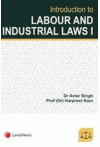- Author(s): Dr. Avtar Singh, Harpreet Kaur
- Publisher: LexisNexis
- Edition: 5 Ed 2022
- ISBN 13 9789391211332
- Approx. Pages 638 + contents
- Format Paperback
- Approx. Product Size 24 x 16 cms
- Delivery Time 3-5 working days (within Kerala & South India) (Others 7-9 days)
- Shipping Charge Extra (see Shopping Cart)
.............................................................................................................................
Description
It is my pleasure to present to you the textbook on Introduction to Labour and Industrial Laws in its new version. The textbook had continued in a single volume till the fourth edition in 2017. Now it has been divided into two parts. Industrial disputes, factories, trade unions, employee compensation, employment standing orders, child and contract labour, apprentices and fatal accidents are covered in Part I in 10 chapters. Part II consists of labour laws relating to wages, gratuity, provident fund, maternity relief and other social security laws. The new version is also coinciding with the labor reforms in the form of introduction of four labour codes namely: The Code on Wages, 2019, Occupational Safety, Health and Working Conditions Code, 2020, Code on Social Security, 2020 and The Industrial Relations Code, 2020. The codes have been notified but were not enforced when I completed editing this part. Therefore, an Introduction to two codes relevant for this part has been added in order to provide a window for students to understand new provisions and make comparisons wherever required. Pandemic in last two years has brought many issues relating to labour on the forefront after the businesses, production and manufacturing stopped due to lockdown. Migration of labour from one state to another and reduced labour payments are two of such major issues. The Supreme Court dealt with the question whether the COVID-19 pandemic and the ensuing lockdown imposed by the Central Government to contain the spread have created a public emergency as per explanation to section 5 of the Factories Act. The section gives the power to a State during public emergency to exempt any factory or class or description of factories from all or any of the provisions of the Act except section 67 subject to required conditions and for required period. The Court held that under section 5, existence of a public emergency must be demonstrated as an objective fact. The co-relationship between the cause and effect must exist. The validity of the State action impinging upon fundamental rights envisages the analysis - whether the law has been made in pursuance of legitimate State aim, whether there is a rational connection between the imposed infringing measures, the situation and the object sought to be achieved, whether measures are necessary to achieve the object and will not infringe rights to an extent greater than is necessary to fulfil the aim and whether sufficient safeguards against the abuse of such interference will be provided by the State.' It was reiterated in a case that the awards of labour courts and tribunals must be passed in compliance with the principles of natural justice. An award does not become binding merely because it has become enforceable.2 Any unilateral withdrawal of any privilege amounts to contravention of section 9-A and is unsustainable.
.............................................................................................................................
Contents
Part I - The Industrial Disputes Act, 1947
Chapter 1. Preliminary
Chapter 2. Notice of Change [Sections 9A & 9B]
Chapter 3. Authorities under the Act
Chapter 4. Reference of Disputes to Boards, Courts or Tribunals
Chapter 5. Procedure, Powers and Duties Authorities
Chapter 6. Strikes and Lock-Outs
Chapter 7. Lay-Off, Retrenchment, Transfer and Closure
Chapter 8. Special Provisions Relating to Lay-Off, Retrenchment and Closure in Certain Establishments
Chapter 9. Unfair Labour Practices
Chapter 10. Penalties
Chapter 11. Miscellaneous Matters
Part II - The Factories Act, 1948
Chapter 12. Introduction
Chapter 13. Interpretation
Chapter 14. The Inspecting Staff
Chapter 15. Health
Chapter 16. Safety
Chapter 17. Provisions Relating to Hazardous Process
Chapter 18. Welfare
Chapter 19. Working Hours of Adults
Chapter 20. Employment of Young Persons
Chapter 21. Annual Leave with Wages
Chapter 22. Special Provisions
Chapter 23. Penalties and Procedure
Chapter 24. Supplemental
Part III : The Trade Unions Act, 1926
Chapter 25. Development Of Trade Union Law In India-Concept Of Trade Union
Chapter 26. Registration Of Trade Unions
Chapter 27. Rights And Liabilities Of Registered Trade Unions
Chapter 28. Regulations
Chapter 29. Penalties And Procedure
Part IV : The Employees' Compensation Act, 1923
Chapter 30. Preliminary
Chapter 31. Employees' Compensation Act
Chapter 32. Commissioners
Chapter 33. Rules
Part V : The Industrial Employment (Standing Orders) Act, 1946
Chapter 34. Introduction
Chapter 35. Main Provisions
Part VI : The Child And Adolescent Labour (Prohibition And Regulation) Act, 1986
Chapter 36. Main Provisions
Part VII : The Fatal Accidents Act, 1855) Ma
Chapter 37. Main Provisions.
Part VIII : The Apprentices Act, 1961
Chapter 38. Introduction
Chapter 39. Preliminary
Chapter 40. Apprentices And Their Training
Chapter 41. Authorities
Part IX : The Contract Labour (Regulation And Abolition) Act, 1970 (37 Of 1970)
Chapter 42. Main Provisions
Part X : Overview of Other Labour Laws
Chapter 43. Introduction and Labour Laws
Appendices
Appendix I to 15
Subject Index
.............................................................................................................................
Author Details
Dr. Avtar Sing: B.Com., LL.M., LLD. (Luck.),Vidya Bhushan (Hindi Sansthan, U.P.),
Ex Reader in Law, Lucknow University, Ex Professor of Business Laws,IIM, Lucknow
Dr. Harpreet Kaur: Asst. Professor IILM - Graduate School of Management,
Greater Noida
............................................................................................................................

